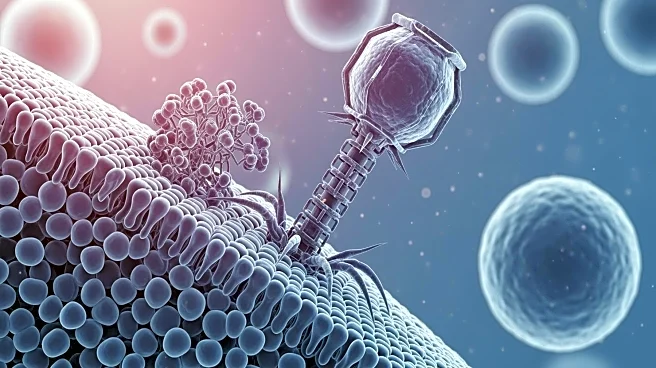What's Happening?
Recent research has identified a novel bacteriophage attachment site within the ffs gene, a component of the signal recognition particle in Enterococcus faecalis. This discovery highlights the process
of lysogenic conversion, where bacteriophage genes integrate into host cells, leading to phenotypic changes. The study found that the integration of the bacteriophage φEf11 into the ffs gene alters the 4.5S RNA product, potentially affecting the signal recognition particle's function. This alteration may impact the translocation of proteins across the cell membrane, influencing cell surface polymer assembly and immune evasion. The research also suggests that lysogenized E. faecalis strains exhibit resistance to endolysin, a bacteriophage enzyme that typically degrades bacterial cell walls.
Why It's Important?
The identification of this novel attachment site is significant as it provides insights into the mechanisms of lysogenic conversion and its impact on bacterial fitness. Understanding how bacteriophage integration alters host cell phenotypes can inform strategies to combat bacterial infections, particularly those involving multidrug-resistant strains. The resistance to endolysin observed in lysogenized strains could limit the therapeutic use of bacteriophage-derived enzymes in treating infections. However, elucidating the structural modifications caused by lysogenic conversion may lead to the development of countermeasures that enhance the effectiveness of bacteriophage therapies.
What's Next?
Further research is needed to determine the exact functional consequences of the altered ffs gene product and its impact on the signal recognition particle. Investigating the structural changes in cell surface polymers could reveal new targets for therapeutic intervention. Additionally, understanding the regulatory mechanisms of prophage integration and excision may offer new approaches to manipulate bacterial gene expression for medical applications. The study's findings could pave the way for novel treatments against resistant bacterial strains by exploiting the bacteriophage-host interaction.
Beyond the Headlines
The study raises ethical considerations regarding the use of bacteriophages in medical treatments, particularly in terms of potential unintended consequences on bacterial populations. The long-term ecological impact of manipulating bacteriophage-host interactions in natural environments also warrants further exploration. Additionally, the research highlights the importance of understanding microbial genetics in the context of public health and disease prevention.








